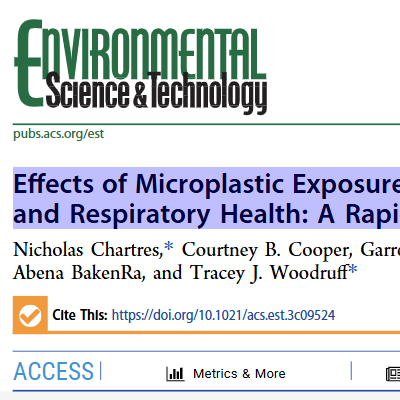
Effects of Microplastic Exposure on Human Digestive, Reproductive, and Respiratory Health: A Rapid Systematic Review
We concluded that exposure to microplastics is “unclassifiable” for birth outcomes and gestational age in humans on the basis of the “low” and “very low” quality of the evidence. We concluded that microplastics are “suspected” to harm human reproductive, digestive, and respiratory health, with a suggested link to colon and lung cancer. Future research on microplastics should investigate additional health outcomes impacted by microplastic exposure and identify strategies to reduce exposure.

Co-exposure of ferruginous components of subway particles with lipopolysaccharide impairs vascular function: A comparative study with ambient particulate matter
The study shows plastic exposure as a significant CVD risk factor regardless of duration. It leads to changes in myocardial tissue, gut microbiota, and metabolites, all closely tied to CVD.

Presence of microplastics in human stomachs
This study presents the first definitive confirmation of microplastic presence in the human stomach, based on samples from 26 cadavers. 97 microplastic particles were extracted from stomach contents, across all 26 individuals, revealing a universal prevalence of microplastics in the cadavers.

Microplastics Occurrence, Health Effects, and Mitigation Policies: An Evidence Review for the California State Legislature
This report responds to a joint request from the California Senate Committee on Environmental Quality and the Assembly Committee on Natural Resources for evidence concerning human health effects of microplastics and public policies related to microplastics prevention and mitigation.
Research was conducted by the California State Policy Evidence Consortium (CalSPEC), anindependent program administered through the University of California Center Sacramento (UCCS) and composed of faculty, staff, and graduate student researchers across UC campuses who evaluate evidence to inform public policy deliberations.

